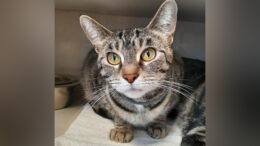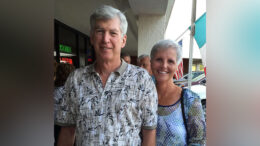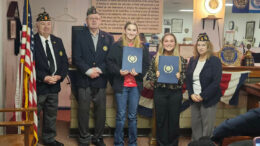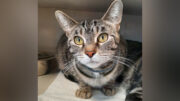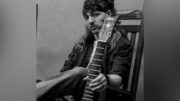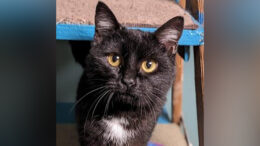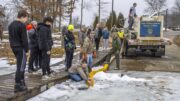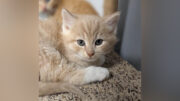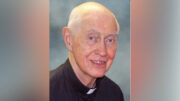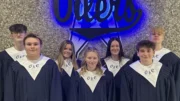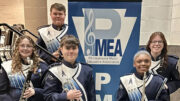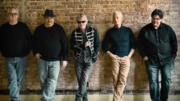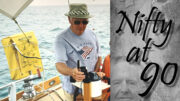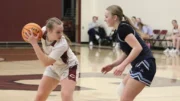OXON HILL, Md. (AP) – The 284 kids competing in this year’s Scripps National Spelling Bee got their first opportunity to approach the microphone on Wednesday – and to hear the dreaded bell that signals an incorrect spelling. At the end of Wednesday’s onstage rounds, the field was cut to 45 spellers for Thursday’s finals.
Here are some highlights from the preliminary rounds, which featured more difficult words than in past years – a trend that will continue into the finals. Scripps changed the rules to make the bee more difficult after the competition ended in a tie for two straight years.
BATTING LEADOFF
Speller No. 1 this year was Erin Howard, which meant all eyes – and extra pressure – were on her when the bee began. Scripps showed it meant business by launching the bee with “abecedarius,” which she got right. She also spelled “tulipomania” correctly to open the second onstage round.
Erin, 11, knew there was a chance she’d be batting leadoff because she’s from Huntsville, Alabama, and the spellers are organized in alphabetical order by state.
“I was hoping they would mess up and put Alaska first,” Erin said. “But no! Had to do it right!”
She didn’t have time to settle her nerves before she was asked to approach the microphone.
“It’s kind of abrupt,” said Erin, who was among the finalists. “Oh, it’s my turn! OK!”
YOUNGEST SPELLER
Six-year-old Akash Vukoti of San Angelo, Texas, was 1 when his uncle asked him to spell the word “spoon” during a trip to his parents’ native India. He got it right.
A year later, his parents drove six hours from Cleveland to northern Virginia so he could compete in his first spelling bee – while still in diapers.
On Wednesday, Akash bounded up to the National Spelling Bee stage and reached well above his head to try to bend down the microphone. At one point, he tried to unscrew it.
His word was “inviscate,” and when it became clear the kid would get it right, a wry smile broke across the face of veteran speller Jairam Hathwar, sitting nearby. Akash briefly put his hands over his ears when the crowd broke out into applause.
In the afternoon, Akash got a standing ovation after he was eliminated on “bacteriolytic,” which he missed by a single letter.
Akash, who has also appeared on “Little Big Shots” with Steve Harvey and dreams of becoming an actor, said he knew every word during the first onstage round.
“All of those words came from the list that everybody studied,” he said.
His other passion: corporate logos.
“You can show me any logo and I can tell you what company it is,” Akash said.
Akash’s mother, Kala Vukoti, a former engineer, home-schools him. His father, Krishna, is a pharmacist.
“He needs to be home-schooled,” Krishna said. “He’s very advanced. He’s like five, six, seven grades higher” than his peers.
AFRICA’S HOPE
Spellers from Ghana, Jamaica, and South Korea were among the 45 finalists. The last international winner of the bee was Jody-Anne Maxwell of Jamaica in 1998.
While Jamaica has produced dozens of strong spellers, the performance of Afua Ansah of Ghana caught observers by surprise. She had the second-highest score on the written test, missing a perfect score by just one point.
“It was easier than I thought,” said Afua, 14.
While many spellers say the pressure is off once they make it to the final day of the bee, Afua said she’s under more stress now. Her goal is to make the top 10.
“A heavy weight on my shoulders,” she said. “I want to prove that I can actually make it.”
Afua isn’t sure what career she wants to pursue – neurosurgeon, lawyer and accountant are all possibilities. The only African speller in the bee, she wore a jacket with a kente pattern as a symbol of national pride.
The best part of the bee, she said, has been bonding with her spellers, “and to be able to share our anxieties.”
I MUST HAVE SPELLED A THOUSAND TIMES
For years, spellers have come up with clever greetings for pronouncer Jacques Bailly. This year, the goal for many was to stump him by saying hello in a foreign language he didn’t know.
But 10-year-old J.J. Chen of Bethesda, Maryland, took Adele as his inspiration for the drollest greeting of the day.
“Hello,” J.J. said.
“Hello,” Bailly said.
“It’s me,” J.J. deadpanned.
Later, J.J. said he came up with the idea when he was bored onstage waiting for his turn to spell. The first round was dull, he said, because he’d memorized all the words on the list.
“In the morning, I counted the number of times I clapped,” he said. “This afternoon, since they were surprise words, it was more interesting.”
J.J.’s parents, James and Yuesha Chen, said their son showed a gift for language at an early age and could spell “transportation” at age 3.
“At daycare, (when) his friends had trouble reading things, they went to J.J.,” James said.
J.J. made the finals, the youngest speller to do so.
DING! DING! DING!
Last year, only four spellers got words wrong during the first onstage round. The words used during that round came from a list that spellers were able to study for months while preparing for their regional bees.
This year, spellers only got the opening-round list about 50 days in advance, and the bell rang for 33 spellers. Among the words that were misspelled: chanoyu, scarlatina, tilleul, preterition, quadrumanous and octateuch.
“This year, we upped the challenge,” said Paige Kimble, the bee’s executive director.
In the afternoon, it got even tougher. The bell rang for 80 spellers. But as Kimble predicted, many of the words sounded easier to the adults in the audience. The afternoon round illustrated the difference between spellers who memorize words and those who have a deeper understanding of roots and language patterns.
The list for the morning round had 400 words. For the afternoon, the only list was Webster’s Third New International Dictionary, which has 476,000 words. Misspelled words included: fraudulent, illegitimate, crotchety and curmudgeon.
PLEASE REPEAT THE WORD
Arushi Kalpande is in her third straight National Spelling Bee, and she’s perfected a technique that many successful spellers have used in the past. Every time she asks pronouncer Jacques Bailly about the word, she repeats it, almost like a mantra. The technique has both practical and emotional benefits.
“When you repeat the word, the judges know if you’re pronouncing the word right,” said Arushi, 14, of Billerica, Massachusetts, who made it to the finals. “It helps you to focus on the word.”
Even if she knows a word, the more she says it, the more her confidence grows.
“It calms you down,” Arushi said. “It’s always been my habit.”
PROUD MOM
Before Mira Dedhia of Western Springs, Illinois, made it to the national bee, she would watch the ESPN broadcast with her father. But her mother, Lakshmi Nair, had a hard time even staying in the room when the bee was on.
The reason: Nair made it to the bee three times, from 1988-1990, and watching it brings back uncomfortable emotions.
“I’m so nervous. I feel like I’m 13 years old all over again,” Nair said. “I can barely stomach it. It’s nerve-wracking.”
While some families have created semi-dynasties with siblings competing in the bee – last year, Vanya Shivashankar became the first sibling of a past champion to win – kids following their parents into the bee have been less common. Nair said she took a hands-off approach.
“I know firsthand how much pressure it was. Once she started winning bees, I was happy to help her,” Nair said. “It’s so much work that you can’t push your kid to do it.”


